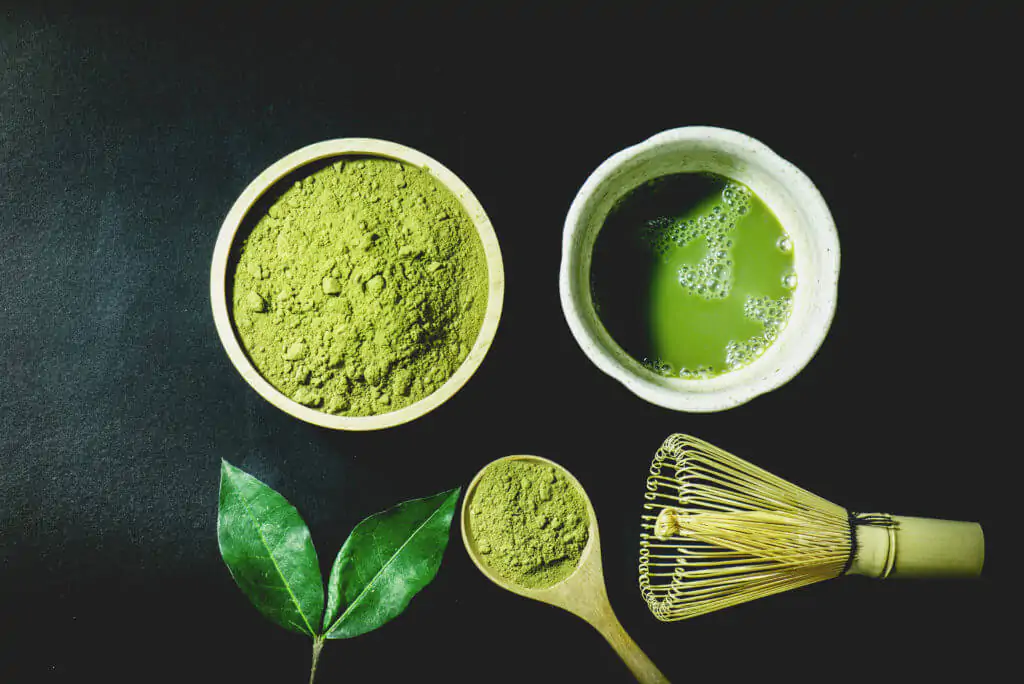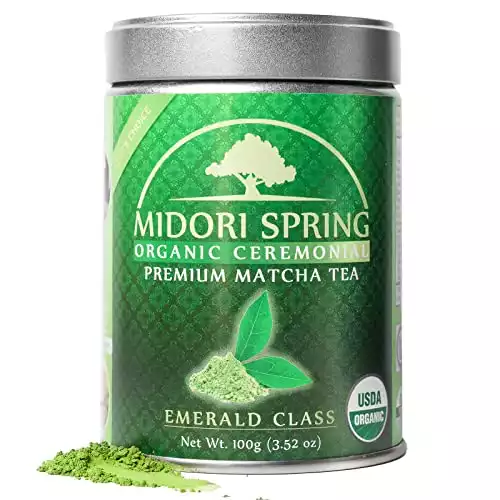Can you put Matcha Powder in coffee? Discover the benefits and techniques for adding a scoop of matcha to your cup the next time you brew at home!

Could matcha and coffee be a match made in heaven? Anyone who’s a fan of hot beverages has undoubtedly been watching the rise of matcha in recent years.
The fact that this Japanese green tea is delicious, offers tremendous wellness benefits, and is so easy to prepare has naturally caused many people to wonder if you can put matcha powder in coffee.
So, Does Matcha Go Into Coffee At All?
The answer is that you certainly can mix matcha into your coffee. Combining high-quality coffee with high-grade matcha to create your morning drink can provide amazing flavor, sustained energy, and impressive health benefits.
Of course, it’s important to understand the properties of matcha to ensure that you’re creating a warm, delicious concoction that can give any fancy drink from your favorite coffee shop a run for its money.
The fact of the matter is that combining coffee with matcha green tea powder like this could help you to start your day with a burst of energy.
- Premium quality
- Organic
- Matcha is rich in antioxidants, with greater than 137x the EGCG levels that of regular steeped tea.
- Practical packagining
You may be wondering why you didn’t think of doing this sooner once you discover how tasty and easy this is! Here’s a look at some of the benefits of mixing matcha and coffee:
- Matcha can reduce the jittery effect of a caffeine jolt due to its concentration of L-theanine.
- Supplementing a cup of coffee with matcha will cut down on the acidic properties.
- Matcha provides a slower release of its caffeine content.
- Both beverages are powerhouses of antioxidants like EGCG and CGA.
- Both beverages boost metabolism.
One of the biggest reasons why people mix coffee and matcha powder is because they enjoy the way it brings out the different flavors in both. Your taste buds may begin noticing hints that had previously gone unnoticed once you whip up a coffee-and-matcha beverage. Many people experience an earthy, chicory-like flavor.
Some people mistakenly believe that matcha is simply a brand name for green tea. This could cause some to believe that mixing matcha and coffee would be odd or unappealing. The truth is that matcha isn’t just another name for regular green tea.
However, matcha is derived from green tea. Matcha is made from the finely ground powder of shade-grown, de-stemmed green tea leaves that have been harvested and processed in a special way.
For more benefit of matcha: 7 Proven Ways Matcha Tea Improves Your Health
The Two Options For Mixing Matcha In Coffee

A matcha-and-coffee concoction can really be made with two different taste preferences in mind. You can alter your recipe to appeal to coffee lovers or tea lovers. That simply means creating a drink that either taste like a lot of matcha with a little coffee or a lot of coffee with a hint of matcha.
The standard way to add matcha powder to your coffee is simply to treat it the same way you would treat a shot of espresso when adding it to milk. Keep in mind that one teaspoon of matcha can work for up to one cup of liquid if you’re trying to work it out like a shot-to-milk ratio.
You also have the option to treat your coffee or espresso as the added “shot” that you mix into your steaming cup of matcha.
How can you get a perfect cup when mixing matcha powder and coffee? It’s important to be attentive just like you would be when making any mixed coffee beverage for the first time. Here’s a look at some tips for getting the best possible results:
- Use high-quality, bright-green matcha.
- Only use freshly made coffee from high-quality coffee beans.
- Use coffee that is piping hot to allow for the two ingredients to mix smoothly.
- Stir the drink with a spoon to allow for everything to mix and settle.
- Consume the beverage right away.
It goes without saying that using quality products all around will help to create a better flavor experience. Do your best to source high-quality matcha green tea that is fresh. In addition, coffee that has just been brewed will provide the best results when it comes to flavor and “attaching” to the matcha powder.
It’s perfectly fine to customize your drink based on your specific taste preferences. In fact, you may want to play around with variations once you’ve perfected your ratio of coffee to matcha. Here are some serving suggestions:
- Add cream or milk to create a frothier drink.
- Sprinkle cinnamon, nutmeg, or cloves on the top.
- Add sugar or other sweeteners to the drink.
- Chill, add ice and blend your drink to create a frozen coffee treat.
You should keep in mind that adding any extra ingredients or toppings to your beverage could result in extra calories. Those calories could undo some of the health benefits that are provided by matcha and coffee.
Of course, even a coffee-and-matcha drink that is “spruced up” with extras will still be a lot healthier for you than the calorie-rich drinks you can get at popular coffee shops.
Why You Might Not Want To Mix Matcha And Coffee
Mixing matcha and coffee may not be for everyone. You might want to avoid creating a hybrid drink if you experience caffeine sensitivity, as it can give you the jitters.
Remember that each serving of matcha still has about 70 milligrams of caffeine. If you want to try the mixture with less caffeine, use decaf coffee.
A Look At The Rich History Of Matcha
Many of us only know matcha as an ultra-trendy beverage that seemed to come out of nowhere to become a taste sensation on the food scene. However, matcha is far from new. This ancient beverage is steeped in tradition, history, and meaning!
You may be curious to know the history of matcha once you fall in love with this rich, comforting beverage. Matcha has a long history in both China and Japan. The traditional Japanese tea ceremony actually centers on the preparation, serving, and consumption of matcha in tea form.
Zen Buddhists helped to bring a ritualistic aspect to the preparation and consumption of matcha. In fact, matcha continues to be a staple at Zen monasteries to this day. It also became a favorite among people in Japan‘s high society once it was introduced centuries ago.
Don’t want to try Matcha? Try putting butter in coffee.
The Final Word On Matcha Powder In Coffee
If you’ve ever had an interest in trying matcha, adding it to your morning coffee is a great way to start. Matcha’s bright green color transfers to coffee easily, giving you an unusual beverage that helps you start your morning with a jolt of energy and focus.
Even if you’re in a rush, there’s no reason to miss out on your morning matcha. Starbucks offers multiple coffee-and-matcha drinks so you can get your fix on the go!
Related Questions
Why Is Matcha Such A Bright Shade Of Green?
Matcha can be easily identified by its bright hue. This coloring is actually a product of the way matcha is grown: Matcha is never exposed to sunlight because it is grown in the shade before being moved indoors. The lack of sunlight boosts the plant’s chlorophyll levels, making it brilliantly green.
Why Is Matcha A Powder?
Matcha begins as leaves from Camellia Sinensis, known as the tea plant. However, the flavor and healing properties of matcha are released by grinding the leaves down to a fine powder using a very careful process.
In addition to being packed full of wellness benefits like catechins, the powdered form is extremely easy to use when whisking matcha into other beverages.
Do I Need Any Special Tools To Make Coffee With Matcha Powder?
No special equipment will be necessary to mix the powder into your coffee.
Do I Need To Make Coffee In Any Special Way Before Adding Matcha?
No special equipment will be necessary to mix the powder into your coffee.
Should You Drink Only Black Coffee With Matcha Powder?
The truth is that some people prefer to mix matcha into black coffee exclusively. Mixing the two without diluting the result with milk or cream will help to maximize the caffeine jolt and health benefits.
However, most of the benefits will be retained even if you do mix in cream or milk. Try making a matcha latte!
Can I Add Almond Or Coconut Milk To Coffee With Matcha Powder?
Both almond milk and coconut milk can be added to coffee with matcha powder.
Can I Drink Coffee With Matcha Powder Every Day?
It should be perfectly fine to consume this drink every day if it doesn’t cause any reactions or side effects. You should always ask your doctor if you have any questions about caffeine sensitivity, health issues, or interactions with medication!
How Many Times A Day Can I Drink Coffee With Matcha?
The general consensus is that it is safe to consume up to 400 milligrams of caffeine per day. This works out to be roughly the amount of caffeine contained in four cups of brewed coffee. You should calculate how much caffeine will be contained in each cup of coffee with matcha you make to ensure that you’re staying within a safe limit for caffeine consumption.
Related Article:
29 Common Mistakes When Brewing Coffee At Home
What Is Frappuccino? 6 Easy Steps


